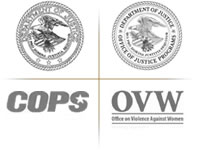



On October 3, 2012, the Department of Justice consulted with tribal leaders from across the nation to discuss the Department of Justice Grant Funding and Budget Priorities.
DOJ officials would like to hear feedback from tribal leaders about their resource needs and grant funding priorities, their experiences with the Coordinated Tribal Assistance Solicitation (CTAS) process that was used for DOJ's tribal government specific grants in Fiscal Year 2010, 2011, and 2012, and their recommendations for how the process can be improved for Fiscal Year 2013. The record for providing comments remains open until October 31, 2012.
To provide comments via email, please send comments to tribalgrants@usdoj.gov by October 31, 2012.
For more information on the department’s tribal grant policies, read the framing paper (PDF).
If you have addition questions, or to submit written comments via postal mail, contact the Office of Tribal Justice at 202-514-8812 or by mail at:
U.S. Department of Justice, Office of Tribal Justice, 950 Pennsylvania Avenue, NW, Washington, DC 20530.

President Obama signed the Memorandum on Tribal Consultation on November 5, 2009. This document pronounces tribal consultations "a critical ingredient of a sound and productive Federal-tribal relationship." The President further directs all federal agencies to develop a detailed plan of the actions they will take to fully implement President Clinton's Executive Order 13175 on "Consultation and Coordination with Indian Tribal Governments" within ninety days. Within 270 days and annually thereafter agencies must provide a progress report on implementation and any updates to the plan. Executive Order 13175 sets forth criteria "to establish regular and meaningful consultation and collaboration with tribal officials in the development of Federal policies that have tribal implications."
The Justice Department embraces this responsibility and the principles of tribal sovereignty and Indian self-determination. The Department has developed a plan as required and, at all levels, is committed to comprehensive communication and coordination policy with tribes predicated on robust tribal input.
Guiding Principles:
Department's efforts are guided by three principles:
- The Department must engage with tribal nations on a government-to-government basis.
- Tribal sovereignty and Indian self-determination are now, and must always be, the foundations of every policy or program.
- Communication and coordination — with our tribal partners, among federal agencies, and with our state and local counterparts — are essential to accountability and thus to success.
Consultation Summaries
December 23, 2009 (PDF)
December 18, 2009 (PDF)
November 27, 2007 (PDF)
March 27, 2007 (PDF)
June 4, 2007 (PDF)
July 31, 2007 (PDF)
March 5-7, 2008 (PDF)

The Justice Programs Council on Native American Affairs (JPCNAA) is the Office of Justice Programs (OJP) senior-level policy body established in 2005 under an approved charter by the Assistant Attorney General of the Office of Justice Programs to develop consistent tribal justice and safety policy, strategies and enhance coordination across the department.
In January 2007, Council membership was expanded to include all senior-level office leaders, who designated JPCNAA federal staff tribal liaisons from their respective bureaus and offices to remain abreast of American Indian, Alaska Native, and Native American affairs. The OJP Assistant Attorney General chairs the council and the Principal Deputy Assistant Attorney General serves as the Vice-Chair.
The council meets semi-annually. The council helps to identify opportunities, programs, and address issues of concern to Indian Tribes and Native communities, coordinates, outreach and consultation on justice and safety issues affecting the American Indian, Alaska Native, and Native American population nationwide. The JPCNAA also serves as a liaison advisory body to other Department of Justice agencies, bureaus and offices that desire to participate on the council.
OJP Members:
Bureau of Justice Assistance
Bureau of Justice Statistics
Equal Employment Opportunity Office
National Institute of Justice
Office of Administration
Office of Audit and Assessment Management
Office of the Chief Financial Officer
Office of Communications
Office of the Chief Information officer
Office of Juvenile Justice and Delinquency Prevention
Office of the General Counsel
Office for Victims of Crime
Sex Offender Monitoring, Registering, Apprehending and Tracking
Office
Other DOJ Members:
Community Oriented Policing Services
Community Relations Services
Executive Office of United States Attorneys
Federal Bureau of Investigation – Indian Country
Unit
Office of Civil Rights
Office of Tribal Justice
Office on Violence Against Women
JPCNAA Charter – Tribal Liaisons and Workgroups: Section V. Organization
Liaisons: Each JPCNAA Member shall identify at least one liaison to serve as a liaison to the Council. The Council Liaison must be knowledge about their respective agency’s bureau’s or office’s programs and budgets, have ready access to senior leadership, and be empowered to speak on behalf of their DOJ agency, bureau, or office. Members may identify additional staff members they believe are necessary to perform the JPCNAA liaison functions.
Workgroups or Advisory groups: The JPCNAA may create workgroups and advisory groups to carry out the work of the JPCNAA. Members may identify staff to perform the JPCNAA workgroup or advisory group activities.
JPCNAA Workgroups
JPCNAA Tribal Public Relations, Consultation, Education and Outreach Workgroup
To ensure a coordinated approach for all tribal press and related public relations activities, increase tribal education efforts regarding OJP and other DOJ components, develop internal communications strategy recommendations, and maintain up to date information for the Tribal Justice and Safety Website.
JPCNAA Research, Data Collection and Information Sharing Workgroup
Improve the coordination among OJP and other DOJ components working on Indian country issues to improve the quality, accessibility, and completeness of tribal justice statistics, research, evaluation, information technology, and information sharing.
JPCNAA Youth Initiatives Coordinating Workgroup
Improve coordination and information sharing between OJP and other DOJ components on Department initiatives and programs for youth, e.g., (Tribal Youth program, Drug Endangered Children, AMBER Alert, Defending Childhood, etc.)
JPCNAA Tribal Grants Policy/Training & Technical Assistance Workgroup
Develop a recommended AAG tribal grants policy, coordinate OJP training and technical assistance providers serving Indian country (CTAS), and develop a recommended training & technical assistance process for OJP to implement which can serve as a model for other DOJ components.
JPCNAA Federal Employee/Workforce Native Education & Training Workgroup
Support the Indian Affairs Executive Working Group development of a draft Executive Order/Proclamation and online training program designed for government-wide federal employee/workforce education and training about American Indian, Alaska Native, Native American (AI/AN/NA) tribal governments; and, to provide recommendations to implement the same programs tailored for DOJ purposes.
SUNSETTED: Tribal Justice Advisory Group
The Tribal Justice Advisory Group was established in 2007 to assist the AAG and JPCNAA with tribal advice on justice and safety
issues. The Attorney General established a Tribal Nations Leadership Council (TNLC) in 2010. The TJAG was sunset to avoid conflict and duplication, and the TJAG Co-Chairs served
as Ex Officio members for the initial TNLC year to assist with transition.
 |
|
Contributors to this site include the Office of Tribal Justice, |




